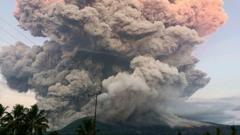With the ongoing Israeli bombardment, Tehran's residents are fleeing, while many like the author's sister choose to stay amidst uncertainty. Essential supplies dwindle as fear grips the city, and residents seek reliable news in the face of potential chaos.
Unrest in Tehran: Families Face Uncertain Futures Amidst Israeli Strikes

Unrest in Tehran: Families Face Uncertain Futures Amidst Israeli Strikes
As air strikes continue to devastate Tehran, residents grapple with fear and confusion in the pursuit of safety and clarity.
Amidst the deafening sound of air raids and the palpable fear in the air, thousands are escaping Tehran, fleeing from the relentless Israeli air strikes. The situation is tense and fraught with confusion, especially for families like mine, who are directly affected by the turmoil.
My sister, who remains in Tehran, frequently reaches out to me through a shaky WhatsApp connection, desperate for answers. Her voice reveals her worry as she asks, "What is going to happen? What should we do?” Echoing this concern, US President Donald Trump has called for evacuations, leaving many questioning the seriousness of his warning.
Since Thursday, the skyline has been punctuated by the presence of Israeli aircraft, while anti-aircraft defenses largely fail to intercept them effectively. Gazing out from her apartment's upper floors, my sister witnesses the chaos, yet has chosen to stay amidst the exodus of countless others. According to her insights, the nearest military targets do not lie in her vicinity, although a nearby commercial establishment potentially linked to the Revolutionary Guards adds to her anxiety.
The closure of shops in Tehran's famed Grand Bazaar is stark; essentials such as flour are dwindling, forcing bakeries to shut down. While basic utilities like electricity and water remain intact, food scarcity is becoming alarming. Despite the increasingly dangerous atmosphere, my sister feels trapped without a clear destination to escape to, in contrast to the many who have already fled the city.
The once-bustling streets of Tehran are now unnervingly quiet, punctuated only by sporadic gunfire and the distant thud of explosions. As petrol supplies have been dwindling, it appears the congestion on key routes is lessening, though the fear of attacks keeps many inside their homes. The threat feels more urgent for those residing near the nuclear facilities, which have been targeted repeatedly—the danger of radiation exposure adds a horrifying dimension to the situation.
In light of the uncertainty, many look towards foreign news sources for information, particularly Persian-language broadcasts that have gained substantial traction amid the chaos. Global media like BBC Persian have suddenly found themselves critical lifelines for accurate updates as Iranian officials grapple with internal dissent and mounting demands for accountability.
While President Trump calls for an Iranian surrender, responses from the Iranian leadership hint at a determined resistance, led by Ayatollah Ali Khamenei’s rejection of capitulation. As the population of Iran grapples with deep-set grievances toward their government, mounting fears of potential anarchy loom if the regime is significantly destabilized. The situation continues to evolve rapidly, leaving many wondering what the future holds for Tehran and its resilient, albeit terrified, residents.






















